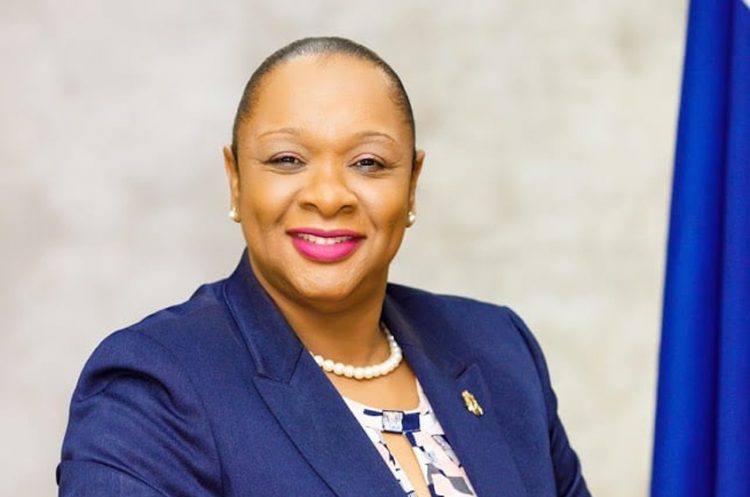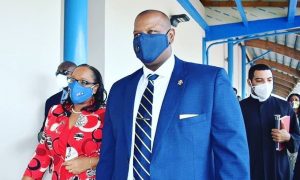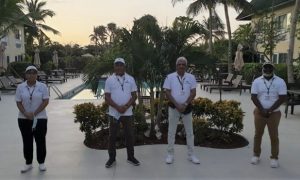Caribbean News
CARTWRIGHT ROBINSON RESIGNS AS PDM PARTY LEADER, EXPRESSES GRATITUDE
Published
5 years agoon

#TurksandCaicos, February 25, 2021 – My people of the Turks and Caicos Islands, You the people of this great country have spoken and there is no defeat when the people have won through their vote. You have said in no uncertain terms that you wanted a new direction and I will always defend your democratic right.
My Party has made an Official Statement today and it was important that it did so first before I offer my final thoughts with the nod of the new Party’s Leader.
As reported on Saturday, as former Premier, I did phone the newly elected Premier and wished him the very best. I say to us all that if we truly love TCI, we should not wish ill. I said it as Premier and I will continue to say that to wish ill on a government as a citizen can be likened to you wishing a plane crash while you are on board.
I sincerely hope that the new government will be able to deliver for the people of the Turks and Caicos because at the time of challenge and amidst this raging pandemic, they deserve strong and decisive leadership.
The people’s success depends almost entirely on their Government’s success in office.
I will urge the new government to continue to look out especially for the most marginal among us, and for those who have been beaten down by this pandemic.
Our Party’s mission of lifting people up, must now be co-opted by this new government – for if it is and if it does it will be in the interest of all the people we came into politics to fight for.
I will personally back the government in following through on its promise to give each voter $2,000 for 3 months and to giving Civil Servants a portion of their salaries for a stimulus, in addition to the policies we had ready set in motion to ensure that people do not fall through the cracks which includes the completion of the current stimulus of $600 for TC Islanders only and for the payment of the $200 household grocery assistance in place of the package of groceries determined logistically to be difficult and then delayed because of elections.
I have been transparent on reporting on the country’s finances and invite the Minister of Finance to continue to do the same. Whilst anyone can find the November’s Report on Government Finances available on the Government’s Website, one will soon be able to see the latest Monthly Report (December) and 3rd Quarter Report that was presented at the last Cabinet last Monday which showed our continued use of savings to cover Government’s commitments and the stimulus offered, the restricted cash (money that can not be touched) at the end of November which includes an amount for the 90 day cash requirement under the UK Framework Agreement, the balances in the National Forfeiture Fund and TCI National Wealth Fund accounts and contracts already awarded. It will also show a high operating deficit, low and depleting reserves, poor performing revenue streams, high expenditure and debt of about $1.1m. The loan for $80m secured is left for drawing down and as reported publicly, it was decided best to leave larger borrowing to a Government with a fresh mandate. The matter of Budget preparation is urgent and it is for the Government of the day to set its priorities.
However, the need to invest in new sectors of the economy is as urgent today as it was yesterday.
And our tasks as citizens are to ensure that they follow up on that.
While in the coming days and weeks, there will be an ongoing post mortem on our term as government, I want it be known that throughout these four years – and against many odds – we have kept the faith and uphold the honor of governance.
We achieved many things against many odds.
But inspite of that, the people have resoundingly decided that they wanted a different tone, and a different direction; and as believers in democracy, we have to respect that for it was the people’s choice that gave us an opportunity four years ago.
In every endeavor, you would always wish you could have done more; and you always wished the many things you did, you could have done even better, but never for one day did we short-change the people or misled them and for this I am proudest.
For all the things we did and did not do – one thing was consistent. We kept the trust.
As the Premier and the leader of the PDM, I took responsibility for the many successes and I too must take full responsibility for the losses.
Though many thousands are disappointed around the country, we will do well to remember the best of times.
This is not the moment to turn on each other; it is not a time for recriminations.
While it is human to always wonder what might have been, we can forever cherish what has been — the many people who were touched by our policies and the many projects we embarked on, with the Vision of 2040 – a blueprint we have left for this new government to pick up on.
Four years ago, you elevated me to one of the most powerful positions in this land; and we made history together.
I will be forever grateful for the support you have given me, and the opportunity I had to serve.
I want to thank publicly all the PDM candidates who sacrificed so much to put themselves up in this election – and I want to especially thank their families as well who have had to loan their loved ones to the wider community.
Let me also express on a personal level, gratitude to my family especially my husband and my two daughters, who were always the lights in my life at the darkest moments. They have consistently been, without complaint, my refuge and my strength. When the political storms came in, I was battered down by their love.
The great British Prime Minister Margaret Thatcher once said: Being prime minister is a lonely job… you cannot lead from the crowd. I have lived that, and come to know that. But having known what I know now, still would not change my experience and my opportunity for anything.
And whilst our Party has lost its bid to lead, it does not take away from the fact that the PDM remains a Great Institution which has shown throughout history – and repeatedly so – that it is the most consistent force at the vanguard of national development.
I must thank the North and South Backsalina communities who stood with our Great Party through a similar defeat years ago and who have again done the same. You are champions and I appreciate you!
Our Party is an Institution and it will take a new generation to carry it forward to its full potential. The immediate task at hand will be with Hon Edwin Astwood, who has become the Opposition Leader. But there is also a whole new generation willing and able to take on the mantle, and to usher in a new era.
On Saturday, I officially handed in my resignation as leader of the PDM, and clear the way for the rank and file to decide on a new leader; a position that I have held since December 2012. This is the right and proper thing to do. And I have now had an opportunity to discuss it with Party Executives. During this time, I served as Leader of the Opposition and as Premier. My exit from active politics marks nearly 12 years of service following on from the Consultative Forum. There are a new breed of leaders waiting and many have already entered and I encourage them to stay committed; do not disappear. TCI needs you!
While I will take a long overdue break to recharge, I will always be here for this great party that I had the honor to lead. I wish to thank my Party and my PDM family for the opportunity and for all the support over the years. When first elected as Leader in December 2012, I was not present at the Meeting and to this date, I have enjoyed a level of confidence that kept me focused even among the criticisms and personal attacks.
While these difficult results will put this movement on pause, it cannot be stopped – for it is a movement that is bigger than any one of us; one that continues to enjoy a good legacy. I leave this Office with my head held high as did my former Leaders and after making significant progressive steps towards a brighter tomorrow.
The dream of lifting our people up – shall never become irrelevant or grow old.
The dream lives on! It shall never die!
Thank you again to the members of the Civil Service and members of Cabinet who assisted in delivering on our mandate to uplift and deliver transformational changes.
I say to my supporters and those who voted for the PDM Party, be encouraged; this is not your defeat. This on the other hand though is a victory for those that voted in majority for a new direction. Do not be upset by persons who used their power, for it was that same power that allowed my Team and I to achieve all we did.
It may have been a turbulent 4 yrs but it was a blessed and productive time for TCI and I thank God for all He brought us through together. I maintain that we must be a grateful people; grateful to God and not ungrateful for He is indeed good to TCI.
I have served 12 continuous years at the forefront in the political arena serving through the Consultative Forum to Leader of the Opposition to Premier. I have a record of doing what others have never dared to or done. I will as before I enter politics, continue my life of service. I remain humbled for the opportunity to serve and know that these last four years when recorded will stand out in the Halls of History as a time of great challenge but also a time of great achievement.
It has been an honor Turks and Caicos.
May God bless you and may He continue to bless these beautiful by Nature Turks and Caicos Islands.
Peace And Love To All!
May God bless you!
You may like
-


A Tale of Two Manifestos and A Tale of Two Leaders
-


TCI: PDM Leader Astwood chimes in on 200 Imported workers at Beaches Resort
-


Sharlene Robinson Does “the Right and Proper thing” and resigns as PDM Party Leader
-


What valuable lessons if any, have we learned from this past election in TCI?
-


What the Governor said at presentation of ‘Instruments’ to new Premier & Deputy on February 20
-


PRELIMINARY STATEMENT OF THE CARICOM ELECTIONS OBSERVATION MISSION TO TURKS AND CAICOS ISLANDS
Caribbean News
Seven Days. Seven Nations. One Storm — Hurricane Melissa
Published
3 months agoon
November 1, 2025
A week of wind, water, and heartbreak
From Haiti’s hillsides to Bermuda’s reefs, seven Caribbean nations have been battered, bruised, and forever marked by Hurricane Melissa — a storm that tested not only the region’s infrastructure but its unshakable spirit of unity.
Saturday–Sunday, October 25–26 – The First Strike: Hispaniola
Before the storm even earned its name, torrential rain and flash floods swept across Haiti and the Dominican Republic, claiming lives and tearing through rural communities.
tearing through rural communities.
In southern Haiti, rivers burst their banks, swallowing roads and homes; 23 people were confirmed dead by Sunday evening. Across the border, one death was reported in the Dominican Republic as swollen rivers cut off villages in Barahona and Pedernales.
By nightfall, the tropical system had strengthened — and the Caribbean knew it was facing something historic.
Monday, October 27 – Evacuations and Airlifts
In The Bahamas, Prime Minister Philip Davis issued a mandatory evacuation for the MICAL Islands — Mayaguana, Inagua, Crooked Island, Acklins, Long Cay, and Ragged Island.
Bahamasair added extra flights as the nation braced for what forecasters warned could become the strongest storm in nearly two decades.
Meanwhile, Jamaica, Turks & Caicos, and Cuba activated their national emergency operations centers.
Tuesday, October 28 – Jamaica and Haiti Hit Hard
By afternoon, Hurricane Melissa made landfall near St Elizabeth, Jamaica, as a Category 5 hurricane — winds of 185 mph, central pressure 892 mb, the lowest ever recorded so close to the island.
Roads collapsed, bridges washed away, and Black River Hospital lost its roof. Power failed for 72 percent of the island.
BOJ TV footage shows split asphalt, sparking lines, and flooded communities abandoned for safety.
Initially four were reported dead, that grew to seven deaths and heavy damage in 170 communities; Andrew Holness, Jamaican Prime Minister calling it “a national test of resilience.”
Haiti, still recovering from the weekend’s flooding, was hit again as outer bands dumped more rain on Les Cayes and Jacmel, deepening the humanitarian crisis.
Wednesday, October 29 – Crossing to Cuba
Weakened slightly to Category 4 (145 mph), Melissa tracked north-northeast at 8 mph, hammering eastern Cuba with hurricane-force winds
and mudslides. Over 15 000 people were evacuated from Santiago de Cuba and Holguín.
In Turks & Caicos, the Regiment deployed to Grand Turk, Salt Cay, South, North and Middle Caicos, preparing shelters and securing public buildings.
Thursday, October 30 – The Bahamas and the All Clear
Melissa’s speed increased, sparing the northern Caribbean its worst.
The Bahamas Airport Authority closed 13 airports from Mayaguana to Exuma International; none reported casualties, though infrastructure suffered.
In Turks & Caicos, the all-clear came early Thursday after minimal impact. Premier Washington Misick expressed gratitude and pledged support for neighbors:
“We must act — not only with words, but with compassion and deeds.”
Friday, October 31 – Counting the Cost
By Friday, Melissa had weakened to Category 3 (120 mph) north of Cuba.
The Bahamas Department of Meteorology issued its final alert, lifting warnings for the southern islands.
Regional toll:
- Haiti: 23 dead, thousands displaced.
- Jamaica: 7 dead, 170 communities damaged; 72% without electricity
- Cuba: 2 dead, 15, 000 evacuated.
- Dominican Republic: 1 dead, flooding in southwest.
- Bahamas: 0 dead, minor infrastructure damage and flooding in southeast.
- Turks & Caicos: minimal to no impact.
Relief and Reconnection
The Cayman Islands became the first government to touch down in Jamaica post-storm. Premier Juliana O’Connor-Connolly led a contingent bringing a plane-load of essentials and pledged US $1.2 million in aid.
Reggae icon Shaggy arrived on a private jet with friends, delivering food, medical kits, and hygiene supplies.
Meanwhile, Starlink and FLOW Jamaica activated emergency satellite internet across Jamaica providing free connectivity through November.
From overseas, U.S. President Donald Trump, speaking during his Asia tour, announced that American search-and-rescue teams and disaster aid will support the region.
“They can depend on U.S. assistance as they recover from this historic storm,” he said.
Faith, Funds, and False Websites
The Government of Jamaica and the Sandals Foundation have both launched verified donation portals for recovery. Officials are warning against fake crowdfunding pages posing as relief sites and urging donors to use only official channels.
A Seventh Nation in the Crosshairs – Bermuda
As Hurricane Melissa left the Caribbean basin, Bermuda found itself next in line.
Forecasts indicated the storm would pass just west of the island late Thursday into Friday, likely as a Category 1 to 2 hurricane with sustained winds near 105 mph.
Though far weaker than when it ravaged Jamaica, officials issued a hurricane warning, urging residents to secure property and expect tropical-storm conditions.
By all appearances Bermuda is heeding the warnings
The Human Response
Across the Caribbean, solidarity surged.
The Global Empowerment Mission (GEM) in Miami began airlifting relief supplies, while churches, civic groups, and businesses in The Bahamas and Turks & Caicos organized drives for displaced families.
“Your dedication gave our islands the strength to face the storm,” Premier Misick said. “Together, as one Caribbean family, we will rise stronger.”
Resilience in the Wake
Melissa’s winds may have faded, but her impact endures. Engineers are inspecting bridges, hillsides, and water systems; volunteers are clearing debris and distributing aid in communities still cut off.
From Haiti’s ravaged river valleys to Jamaica’s sugar towns, from Cuba’s eastern hills to The Bahamas’ salt ponds and Bermuda’s reefs, the region once again stands at the crossroads of ruin and renewal — and leans, as always, toward hope and a faithful God
Caribbean News
Haitian Pushback Halts Controversial Constitution Rewrite — What’s Next?
Published
4 months agoon
October 15, 2025
Deandrea Hamilton | Editor
Haitian media, legal scholars and civic voices did what bullets and barricades couldn’t: they stopped a sweeping constitutional overhaul widely branded as anti-democratic. Editorials and analyses tore into proposals to abolish the Senate, scrap the prime minister, shift to one-round presidential elections, expand presidential power, and open high office to dual-nationals—a package critics said would hard-wire dominance into the executive at a moment of near-lawless insecurity.
The Venice Commission—Europe’s top constitutional advisory body—didn’t mince words either. In a formal opinion requested by Haiti’s provisional electoral authorities, it pressed for clear legal safeguards and credible conditions before any referendum, including measures to prevent gang interference in the electoral process—an implicit rebuke of pushing a foundational rewrite amid a security collapse.
Facing that drumbeat, Haiti’s Transitional Presidential Council has now formally ended the constitutional-reform initiative. The decision, taken at a Council of Ministers meeting at the National Palace, effectively aborts the rewrite track that has haunted Haiti since the Moïse and Henry eras.
So what now? Per the Miami Herald, the pivot is back to basics: security first, elections next. That means stabilizing Port-au-Prince enough to run a vote, rebuilding the electoral timetable, and empowering the provisional electoral machinery—none of which is simple when gangs control vast chunks of the capital and state authority remains fragile. Recent headlines underline the risk: gunfire has disrupted top-level government meetings, a visceral reminder that constitutional theory means little without territorial control.
Bottom line: Haitian journalists and public intellectuals helped slam the brakes on a high-stakes centralization of power that lacked legitimacy and safe conditions. International constitutional experts added weight, and the transition authorities finally conceded reality. Now the fight shifts to making an election possible—clean rolls, secure polling, and credible oversight—under circumstances that are still hostile to democracy. If the state can’t guarantee basic safety, any ballot is theater. If it can, shelving the rewrite may prove the first real step back toward consent of the governed.
Caribbean News
Political Theatre? Caribbean Parliamentarians Walk Out on House Speaker
Published
4 months agoon
October 14, 2025
By Deandrea Hamilton | Magnetic Media
October 14, 2025 – It’s being called political theatre — but for citizens, constitutional watchdogs, and democracy advocates across the Caribbean, it feels far more serious. Within a single week, two national parliaments — in Trinidad and Tobago and St. Kitts and Nevis — descended into turmoil as opposition members stormed out in protest, accusing their Speakers of bias, overreach, and abuse of parliamentary procedure.
For observers, the walkouts signal a deeper problem: erosion of trust in the very institutions meant to safeguard democracy. When Speakers are viewed as political enforcers instead of neutral referees, parliaments stop functioning as chambers of debate and start performing as stages for power and spectacle — with citizens left wondering who, if anyone, is still accountable.
October 6: St. Kitts Parliament Erupts
The first walkout erupted in Basseterre on October 6, 2025, when Dr. Timothy Harris, former Prime Minister and now Opposition Leader, led his team out of the St. Kitts and Nevis National Assembly in a protest that stunned the chamber.
led his team out of the St. Kitts and Nevis National Assembly in a protest that stunned the chamber.
The flashpoint came as the Speaker moved to approve more than three years’ worth of unratified parliamentary minutes in one sitting — covering 27 meetings and three national budgets — without individual review or debate.
Dr. Harris called the move “a flagrant breach of the Constitution and parliamentary tradition,” warning that the practice undermines transparency and accountability. “No serious parliament can go years without approving a single set of minutes,” he said after exiting the chamber.
The Speaker defended the decision as administrative housekeeping, but critics were unconvinced, branding the move a “world record disgrace.” The opposition’s walkout triggered renewed calls for the Speaker’s resignation and sparked a wider public discussion about record-keeping, accountability, and respect for parliamentary norms in St. Kitts and Nevis.
October 10: Trinidad Opposition Follows Suit
Four days later, on October 10, 2025, the Opposition United National Congress (UNC) in Trinidad and Tobago staged its own walkout from the House of Representatives in Port of Spain.
The UNC accused the Speaker of partisan bias, claiming she had repeatedly blocked urgent questions, ignored points of order, and allowed government members to breach standing orders without consequence.
“The Speaker has failed in her duty to act impartially,” the Opposition declared in a statement. “Parliament is not the property of any political party or Presiding Officer.”
The dramatic exit was seen as a culmination of months of rising tension and frustration, with opposition MPs arguing that parliamentary rules were being selectively applied to silence dissenting voices.
Political analyst Dr. Marcia Ferdinand described the twin walkouts as “a warning sign that parliamentary democracy in the Caribbean is teetering on the edge of performative politics.”
“When chairs become political shields rather than constitutional referees,” she said, “democracy becomes theatre, not governance.”
A Pattern Emerging
While St. Kitts and Trinidad are very different political environments, both incidents point to the same regional fault line: the perception that Speakers — the guardians of parliamentary order — are no longer impartial.
In Westminster-style systems like those across the Caribbean, the Speaker’s authority depends not on power but on public confidence in fairness. Once that credibility erodes, parliamentary control collapses into confrontation.
Governance experts say the implications are serious: eroded trust between government and opposition, declining public confidence in state institutions, and growing voter cynicism that “rules” are flexible tools of political advantage.
Why It Matters
Parliamentary walkouts are not new in the Caribbean, but what makes these recent events different is their frequency and intensity — and the regional echo they’ve created. Social media has amplified images of lawmakers storming out, with citizens from Barbados to Belize questioning whether the same erosion of decorum could be happening in their own legislatures.
the regional echo they’ve created. Social media has amplified images of lawmakers storming out, with citizens from Barbados to Belize questioning whether the same erosion of decorum could be happening in their own legislatures.
Analysts warn that if this perception takes hold, it risks diminishing the moral authority of parliamentary democracy itself.
“Once opposition MPs believe the rules are rigged, and once citizens believe Parliament is just performance,” said one Caribbean governance researcher, “you’ve lost the most valuable currency in democracy — trust.”
Restoring Balance
Political reformers across the region are calling for tighter Standing Order enforcement, independent parliamentary service commissions, and training to strengthen Speaker neutrality. Civil society leaders say the public must also play its part by demanding transparency and refusing to normalize partisan manipulation of parliamentary procedure.
Whether these twin walkouts become catalysts for reform — or simply another episode of Caribbean political theatre — will depend on what happens next inside those chambers.
For now, democracy watchers agree on one thing: when opposition leaders feel the only way to be heard is to walk out, the entire democratic house — not just its Speaker — is in danger of collapse.
Angle by Deandrea Hamilton. Built with ChatGPT (AI). Magnetic Media — CAPTURING LIFE.






